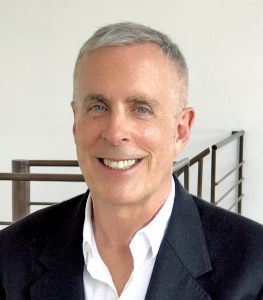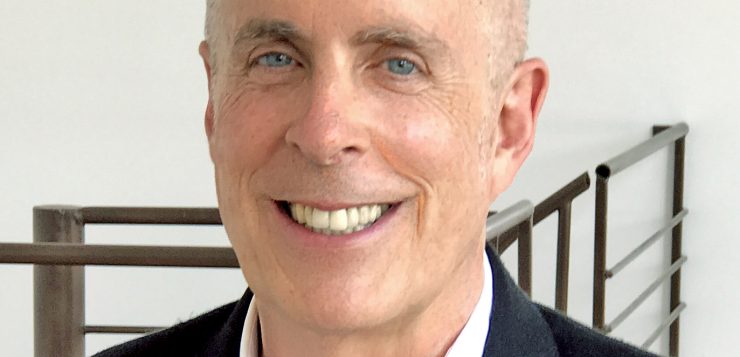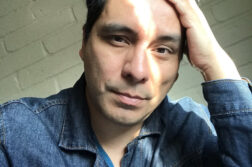IN THE YEARS since his debut novel Terre Haute came out in 1989, Will Aitken has created a rich body of literary work that depicts sharply distinctive but flawed characters. Terre Haute, the name of his Indiana hometown, features a fourteen-year-old adolescent boy who struggles through an abusive relationship with an older man. He followed up with the poignant, semi-autobiographical A Visit Home (1993) and the portrait of a zany, sexually adventurous woman in Realia (2000).

Moving to Montreal in 1972, Aitken co-founded the city’s gay bookstore, L’Androgyne, in 1974 (it closed in 2002), and completed his studies at McGill. He was a film instructor at Dawson College, retiring in 2016. His latest book, Antigone Undone: Juliette Binoche, Anne Carson, Ivo van Hove and the Art of Resistance (University of Regina Press), recounts his immersion in the rehearsals and productions of a 2015 production of the classic play Antigone. The book is an intense high-wire act, detailing the creative processes of Oscar-winning actress Binoche, Carson (who translated the 5th-century BC play), and director van Hove, while ultimately conveying the author’s own severe depression after taking it all in.
I interviewed Aitken in his Montreal home in April.
Matthew Hays: When your first novel, Terre Haute, came out, were you surprised that many people interpreted it as a quasi-pro-nambla book?
Will Aitken: Yes, I didn’t realize that until I was invited to a gay literary festival in Boston to be on a panel shortly after the book came out. The two other people on the panel were nambla people, and I think most of the audience was too. So they asked me what my book was about. So I said it was a book about a pedophile of the worst sort. I could see much of the audience bristle. After I talked about my book, they went on to the other two panelists who talked about the beauty of man-boy love. They never came back to me. Nobody asked me a question. One of the most uncomfortable moments in my life. It was as if I’d spoken to an empty room and no one heard what I said.
MH: Why do you think it was interpreted that way?
WA: It shows a relationship between a forty-something straight man and a fourteen-year-old boy, and the boy falls in love with him and idolizes him. But the man rapes the boy toward the end of the book. I’m not one of those people who sermonizes, but I think I give enough information about the characters for readers to determine what they are about. This was a really exploitative relationship. The kid did learn a lot about art, as he was working for the man, but it was pretty horrendous. Even as recently as a few years ago, I’d go into a gay bookstore and it’d be in the boy love section. Shortly after the book came out, I complained to Glad Day Bookstore [in Toronto]about it being placed in the boy love section. Not how I ever intended it.
MH: In 2000, you created a powerful figure in the lusty character of Louise, in Realia. Gay writers often create such sharp women characters. Do you think there’s an affinity between gay male writers and strong female characters?
WA: Funny you should ask that, because at the time I got a lot of shit from feminists about that character. I went out for lunch with someone quite high up in publishing in the UK, and she said, “This is not really a female character, it’s about you in drag.” And I said that it certainly pulls on the female side of me, but she responded that no woman would ever act like that. I couldn’t say it to her, but it was based on a real person, a friend of mine. The generation of women who are my age really hated that book. But the generation who came after that were really excited by it and felt she was a really cool character who did what she wanted and didn’t apologize to anyone. She makes her own rules and upsets everyone, but she doesn’t care.
MH: Is that part of what drew you to Antigone in your latest book?
WA: She’s not even just a strong woman, she’s a strong teenager. Antigone is very young, and she lived in a society where women were not supposed to speak out publicly. She defies the king and is horribly punished for it, but also brings the king down. She’s a fabulous figure, but no one knows quite what to do with her. She’s this feminist hero, but she’s also a princess, and she says in the play that she wouldn’t have helped a slave but she would help her brother because he’s royalty. She’s so protean, she’s so changeable. The more I thought of her, the more she opened up realms of discourse and parallels to now. To me she felt like an anti-Trump figure. She’s a gift to anyone who writes about her or performs her. She is also a poisoned chalice. Juliette [Binoche] told me that Antigone is one of those roles that actually kills actresses. After a nine-month tour, Juliette said Antigone had really gotten under her skin.
MH: You approach theories surrounding this play—you even get into Judith Butler—but you also talk about the emotional fallout you felt after watching rehearsals and several performances. Were you reluctant to bring those very personal elements in?
WA: Yes and no. I’ve worked as a professional journalist for so long. As a journalist, you’ve had objectivity hammered into you, and keeping yourself out of the story. I thought, if I’m going to do this, I’m going to do it full tilt, and it’s going to be about everything that was happening to me while I was supposedly relaxing in Amsterdam. I wanted to get the flavor of my depression. It’s something I’ve always struggled with. Someone once said that if you have a family life that almost kills you, then you’re set for life as a writer. And I had that kind of experience, and that has dogged me—it comes back to me during stressful moments. I really wanted to depict that from the inside. I wanted to show my back story. It’s about the labyrinth of depression that I was in. Credit goes to my publisher, Bruce Walsh. He really pushed me to reveal more. I was actually having suicidal ideation. My shrink read back some of what I had said to him when things were really dark, and I couldn’t believe it. It was horrible what I was going through, but I wanted to depict it honestly and completely. Many artists and writers have contacted me to say how the book has touched them, that they have suffered a similar despair in the Trump era.
Matthew Hays teaches film studies at Concordia University and Marianopolis College in Montreal.






